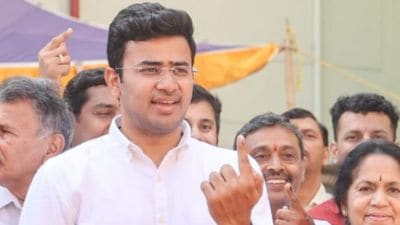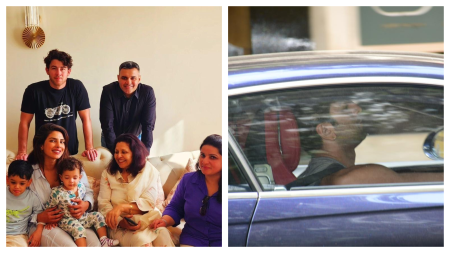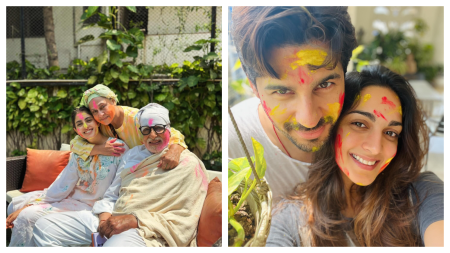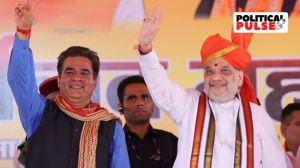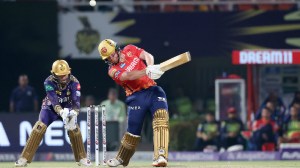- India
- International
Cinema on a barren landscape
The third edition of The Ladakh International Film Festival was attended by a host of film celebrities
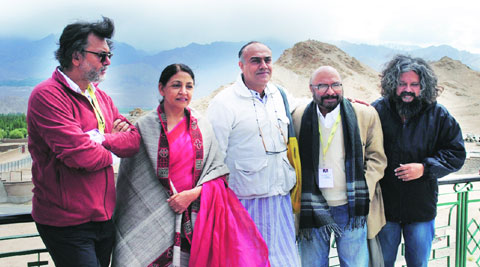 Rakeysh Omprakash Mehra, Deepti Naval, Rajit Kapur, Govind Nihalani and Amole Gupte
Rakeysh Omprakash Mehra, Deepti Naval, Rajit Kapur, Govind Nihalani and Amole Gupte
Under the azure sky, the sounds of music and drama reverberated through the barren, rocky mountains of Leh-Ladakh. The third edition of the recently-concluded Ladakh International Film Festival that took off on June 27-29, saw a fair number of celebrities attend the fest held at the Sindhu Sanskriti Kala Kendra, situated at an altitude of 11,000 feet. Rakeysh Omprakash Mehra, Anurag Kashyap, Govind Nihalani, Deepti Naval, Amole Gupte, Rajit Kapur were among those present. As the focus this year was on Korean films, the acting ambassador Taein Chung was present on the opening day.
Curtain raiser
His Holiness Gyalwang Drukpa (head of Drukpa lineage) Thuksey Rimpoche declared the festival open by lighting the traditional lamp. Deepti Naval paid a tribute to late actor and her co-star of nine films, Farooque Shaikh, stating, “He was an endearing artiste and human being.” The festival kick-started with Kamal Swaroop’s National Award winning non-feature film, Rangbhoomi, a biopic on the life of Dadasaheb Phalke.
A total of 67 films that were entered were broadly segregated into Competition Feature, Competition Documentary, Competition Shorts, Indian Feature, Indian Documentary, Indian Shorts, International Feature, International Documentary and International Shorts category. While the earlier two editions of the festival had received a heartening response, this year, however, it turned out to be a lacklustre show. The local populace and Ladakhi film-makers were conspicuous by their absence.
The jury, this year comprised the Chairperson Govind Nihalani, Maxine Williamson, Head Asia Pacific Screen Awards and Klaus Eder, Secretary International Federation of Film Critics. What was significant for Nihalani was to gain an understanding of different perspectives of film-making from across the world. “There is an inquisitiveness about the content of films amongst film-makers from across the world. Watching different films gives us an insight into what people are seeking. We watched the films, discussed what we liked or disliked about the film and then decided on the winners. But, let me say, that this year, it has been an unanimous decision in selecting the final winners,” says Nihalani. Williamson, who was full of energy and verve throughout the fest, described it as an amazing journey and was impressed by Mehra’s film Bollywood: The Greatest Love Story Ever Told. “It has definitely gained an international audience,” she says while Eder, preferred to introspect on what made the songs and dance so popular in Indian cinema. “I would like to question the aspirations that these sequences fulfill in the life of the average Indian viewer to make them so popular?”
Melwyn Williams, the man-in- command of the festival, bemoans the lack of government support. Pointing to the fact that building the Kendra was no mean feat, he reveals, “This place was built in wilderness and has a 5.1 Dolby sound and 35 mm projector. It was inaugurated on June 15, 2012, but instead of using it to its fullest, the place is instead used by local politicians according to their whims and fancies. We are film-makers and want to promote culture, that will live forever. We are also planning to build a small film community that will help nurture local talent.”
Talking about the non-presence of local makers, Williams has a shocking tale to narrate. “Most film-makers here work part-time, doing menial jobs, like helping in the construction, digging in order to sustain themselves! This year, especially, they were busy with elections, hence no films were made. Besides, the Kaalchakra (a spiritual congregation presided over by Dalai Lama) was another event that took their time.” In fact, most of the celebrities present lamented the fact that there was no local representation. “Local participation should be on a large scale. This is an issue that needs to be seriously addressed,” opined both Deepti Naval and Rajit Kapur.
There was no denying the fact, that this year there were several flaws in the organisation of the festival. While most of us were keen to catch up on world cinema, especially Korean films, several technical glitches marred the viewing, with the result that several screenings were cancelled. Transformers 4:Age of Extinction that was scheduled to screen on Friday, June 27 was cancelled. Instead, the attending celebrities and media were trooped off to the Druk High School. A cultural dance and song programme was organised by the school children in the open grounds. Later, Rakeysh Omprakash Mehra’s film Bollywood:The Greatest Love Story Ever Told was screened under the starlit sky providing a magical moment to cine lovers. “I was very averse to use the word Bollywood,” states Mehra, whose film will be available on DVDs as it is not meant for commercial release. The idea, he said, stemmed from him wanting to pay a tribute to Indian cinema. “Shekhar Kapur is the culprit. He called me in the middle of the night one day and said that we should make a film on Indian cinema,” says Mehra. The film is interwoven in an interesting manner, using a collage of songs and dances from popular Hindi films to depict the four phases of Indian cinema.
Ugly, Anurag Kashyap’s next after the path-breaking Gangs of Wasseypur, saw its Asian premiere at the festival and was screened on the second day. The film that will release worldwide on September 19, is a gripping psychological drama. “Someone had seen some rushes of Ugly in February or March (this year) and asked me to rush it for Cannes. The film has been edited again after the Cannes screening. Also, I was fighting a court battle, which I have lost … so now, Ugly is finally releasing on September 19 with the ‘Smoking is injurious to health’ disclaimer, which I totally detest,” Kashyap said.
On the third day, celebrities gathered at the flowing Sindhu river for the fish planting ceremony — an important event that signifies purifying the environment of its impurities. Later, Deepti Naval’s slice-of- life film Do Paise Ki Dhoop Aur Chaar Aane Ki Baarish that completely bowled over the viewers was screened. Mehra’s wife and film editor P.S.Bharathi’s documentary Rubaru, on the making and the hurdles that they had to overcome while making Rang De Basanti was also screened at the Kendra. The book, Rang De Basanti, The Original Screenplay was later unveiled by National Award winning film-maker Shaji Karun who also gave away the prizes to the winners.
Amole Gupte, who was present with wife Deepa Bhatia and son Partho, held a workshop for the local Ladakhi children. His film Hawaa Hawaai was also screened at the festival. In fact, day three turned out to be most productive as far as film viewing was concerned.
The closing ceremony was a hurried affair. The screening of Transformers… for the army jawans was cut short to announce the winners. Sure enough, the jawans who were watching the film, were quite miffed about it. The screening resumed after the awards were announced. Williams, however, was conspicuous by his absence as the closing ceremony went underway with the announcement of the winners by Maxine Williamson and Klaus Eder. The trophy was given away by Shaji Karun.
Even as the sunset on the horizon, and the festival came to an end, the disappointment at not being able to watch a retrospective of Akira Kurosawa and Guru Dutt’s work lingered. However, despite all odds and the stumbling blocks, the effort was noteworthy. Williams has already begun planning for the next year and hopes to create a special section for Ladakh and introduce a segment called Unheard Voices, that would include film-makers, poets, writers from any corner of the world. Glossing over the flaws, Mehra, succinctly puts it,”The child is a newborn. It is just three years old and still learning to walk.”
Fighting battles
Anurag Kashyap’s film Ugly had its Asian premiere at the festival. However, the film-maker was worried that the story would be leaked out as the film is to release soon. “Please do not reveal anything about the film,” he pleaded. When asked about fighting the cause of Ladakhi film-makers, Kashyap candidly quipped, “I have enough battles of my own to fight. I don’t want to take on any, if I am unable to see it through its logical end.”
Love affair
Deepti Naval professed her love for Ladakh stating that her affair with the region began way back in 1993 when she had come with her trekking boots on and a camera slung over her shoulder. Later she also held an exhibition of her works titled Colour Of Sky. “I came back in 2004 to participate in the frozen river trek. Since I did not want to miss the expedition, I arrived in Ladakh in December and set base 15 days before the expedition took off.”
Winners List
Best Director Short Film: Villari, India
Jury Grand Prize: White Van Stories, Sri Lanka
Best Documentary Film: Roque Dalton Lets Shoot The Night, Cuba
Grand Jury Prize: The Homecoming, Venezuala

Best Directorial Debut: Ram Ramesh Sharma for The Virgin Arguments (Kaafiron Ki Namaaz), Kashmir
Best Actress: Masoumeh Ghasemipur for Wet Letters , Iran
Best Actors: The late Chandraas Tiwari and Alok Chaturvedi for The Virgin Arguments (Kaafiron Ki Namaaz) , Kashmir
Best Cinematography: Mohammad Rasouli for Wet Letters, Iran
Best Screenplay: Ram Ramesh Sharma for The Virgin Arguments (Kaafiron Ki Namaaz) , Kashmir
Best Director: Masoumeh Ghasemipur for Wet Letters, Iran
Best Feature: The Virgin Arguments (Kaafiron Ki Namaaz), Kashmir
farida.khanzada@expressindia.com
Photos
Apr 26: Latest News
- 01
- 02
- 03
- 04
- 05











